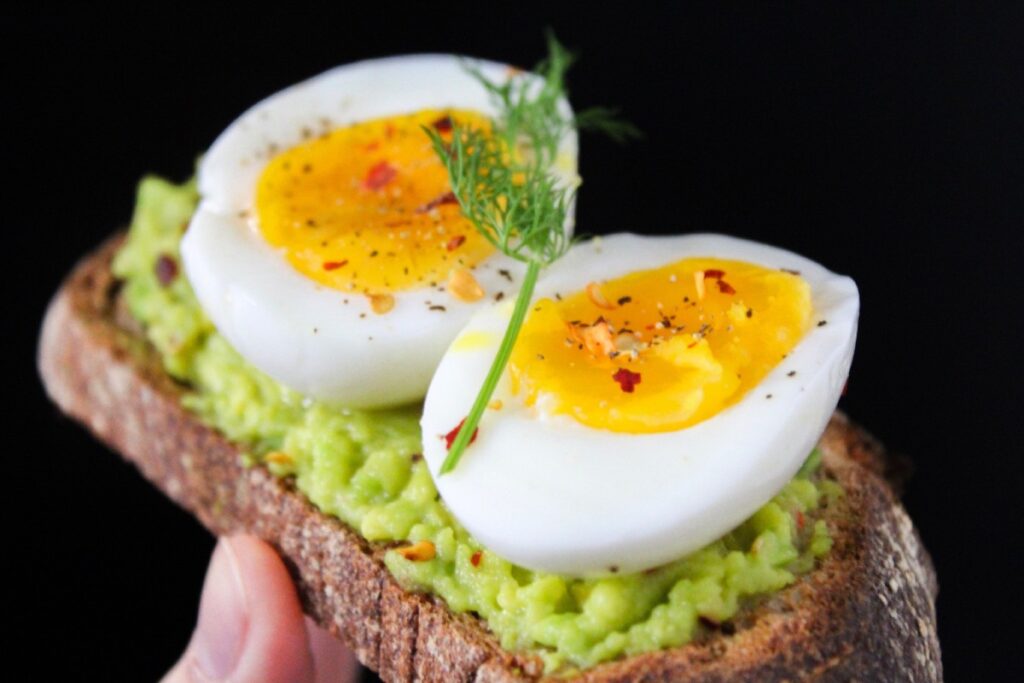
Foods For Muscle Gain
When it comes to choosing foods to build muscle, it’s important to pick the right ones that help our bodies grow.
Just going to the gym and lifting weights isn’t enough to get a strong and muscular body.
You also need to eat a balanced diet with lots of nutrients to make your muscles grow as much as possible.
It doesn’t matter if you’re an athlete, someone who loves fitness, or just want to be stronger; understanding how important good food is for your body is key.
In this article, we’ll talk about “Foods for Muscle” and look at the best foods that can help you gain muscle and get stronger.
By the end, you’ll know the top 12 foods that are great for building muscle and getting stronger.
Understand the Power and Key Role of Nutrition
Eating the right foods is important if you want to build muscle, recover from training, and keep your energy levels up.
According to the International Society of Sports Nutrition (ISSN), most people who exercise can build and maintain muscle by consuming 1.4 to 2.0 grams of protein per kilogramme of body weight each day.
If you’re doing intense resistance training, you might benefit from consuming up to 3 grams of protein per kilogramme of body weight daily.
In addition to protein, it’s crucial to eat enough carbohydrates to build muscle effectively. Carbs help replenish the energy stored in your muscles and liver, preventing fatigue during training.
The ISSN recommends that about 45 to 55% of your daily calories should come from carbohydrates for a regular fitness programme. However, if you’re doing a lot of training, you might need more carbs than that.
To support any training programme, including resistance training, you should eat a healthy diet that includes vitamins, minerals, and healthy fats. It’s also important to stay hydrated by drinking enough water.
Vitamins, minerals, and water are essential for performing well, recovering from exercise, and maintaining overall health.
To build lean muscle mass effectively, it’s also necessary to consume more calories than your body burns. This means creating a calorie surplus by eating more calories than you use throughout the day.
The 12 Best Foods for Muscle Building and Strength
It’s important to know what foods can help you gain muscle because it leads to better results. If you want bigger and stronger muscles, working out is crucial.
When you exercise and lift weights, your muscles break down and then rebuild themselves to be stronger and bigger. But your body can’t magically create new muscle out of nothing.
To make progress, you need the right nutrients in your body to build muscle. This means that what you eat and how much you eat are really important for gaining muscle.
If you don’t have enough nutrition, especially protein, you can actually lose muscle tissue instead.
The best foods for building muscle are ones that have lots of protein and less saturated fat.
However, we can’t forget about carbohydrates and fats because they give our bodies the energy they need. To get the best results, we need a balanced diet and a good exercise plan.
You might be surprised to find out that the best muscle-building foods are probably already in your kitchen.
Some of the foods listed below might be ones you eat regularly, while others could be a surprise.
But rest assured that each of these foods will effectively support your efforts to develop lean muscle.
1. Eggs
Eggs are undoubtedly one of the best foods for protein. Did you know that eggs are an excellent source of protein?
Not only do they contain healthy fats and other important nutrients like vitamin B and choline, but the proteins in eggs also help increase muscle strength.
However, eggs have other beneficial substances too.
Contrary to popular belief, the dietary cholesterol found in egg yolks does not raise blood cholesterol levels.
Including eggs in a balanced diet can be beneficial for bodybuilders. When you aim to build muscle, your body requires fat for energy, especially during the growth stage.
Eggs are not just rich in protein; they also contain vitamin B, which supports various processes in your body and aids in energy production.
Additionally, eggs are packed with amino acids, such as leucine, that contribute to muscle gain and recovery.
Moreover, they provide essential minerals like zinc, iron, and calcium that your body needs.
So, remember to include eggs in your diet if you want to give your muscles the nutrients they need to grow and stay strong.
2. Milk
Milk is another excellent source of protein for muscle development. This dairy product contains protein, carbs, and fats.
Skimmed or 1% fat milk has 8 grams of protein in 8 ounces, while high-protein milk has 13 grams of protein in the same amount.
Milk contains two types of proteins: whey and casein. Whey protein digests quickly, while casein protein digests slowly.
Additionally, milk provides essential nutrients like glutamine, an amino acid, and omega-3 fatty acids, which support muscle growth.
Studies have demonstrated that drinking milk before and after intense weight lifting workouts effectively increases muscle mass.
Therefore, including milk in your diet can be beneficial for building muscles.
3. Chicken Breasts
Chicken stands out as an excellent food for building muscles. It contains a rich amount of protein, which plays a vital role in muscle growth.
Adding chicken to your diet is highly recommended due to its high protein content, which surpasses that of many other foods.
To illustrate, consuming a mere 3-ounce serving of chicken breast provides you with approximately 26 grams of high-quality protein.
Chicken not only offers ample protein but also serves as a valuable source of essential vitamins, such as B vitamins (niacin and B6).
These vitamins are crucial for muscle development and overall bodily health.
Moreover, scientific studies have demonstrated that a protein-rich diet contributes to increased fat burning and safeguards against muscle loss during workouts or training sessions.
Thus, incorporating chicken into your meals can actively support the building and maintenance of robust muscles.
4. Lean Beef
Beef is an excellent food for building muscles. It plays a vital role in muscle development because it contains a high amount of protein.
In addition to protein, beef is rich in important nutrients like amino acids, vitamin B, and creatine, which contribute to increasing muscle mass.
When beef comes from grass-fed cattle, it contains even more conjugated linoleic acid, which helps reduce body fat and supports muscle growth.
If you’re engaging in weight training exercises to gain muscle mass, including beef in your high-protein diet can maximise the benefits. Just remember to choose beef options that aid in muscle building while providing fewer calories.
Let’s look at an example: A 3-ounce portion (about 85 grams) of 70% lean ground beef contains 235 calories and 16 grams of fat.
To give you an idea, 100 grams of beef, roughly the size of a hamburger patty, provides around 26 grams of protein.
Lean beef is also a good source of zinc, an essential nutrient for testosterone production and faster post-exercise recovery.
Beef also contains saturated fats that help maintain healthy testosterone levels. Testosterone, an important hormone, plays a key role in building muscle mass and overall strength.
Red meat sourced from grass-fed cattle has higher levels of conjugated linoleic acid, which aids in reducing body fat and promoting muscle growth.
5. Spinach
Spinach is an excellent food for building muscles because it contains an important amino acid called glutamine.
Glutamine acts as the building block for proteins in your body, playing a vital role in developing lean muscle mass.
If you’re engaged in heavy weight training and aiming to gain muscles, having an adequate amount of glutamine can be highly beneficial.
Recent research has investigated spinach extract and discovered an intriguing compound known as Ecdysterone. Ecdysterone is a phytosteroid, a natural steroid found in plants, including spinach.
This compound has been proven to enhance muscle strength, which is quite remarkable!
Further studies have also indicated that Ecdysterone aids in increasing protein synthesis in your muscles.
This means it helps your muscles produce more protein, which is essential for muscle growth and repair.
Moreover, spinach is rich in calcium and iron. These minerals are crucial for promoting strong and healthy bones.
By incorporating spinach into your diet, you not only support muscle development but also ensure the strength and well-being of your bones.
6. Salmon
Salmon not only promotes muscle building but also stands as the best food choice for maintaining overall health.
It contains high-quality protein and is rich in long-chain omega-3 fats like DHA and EPA.
A 3-ounce (85-gramme) serving of salmon provides approximately 17 grams of protein, 1.5 grams of omega-3 fatty acids, and important B vitamins.
Omega-3 fatty acids play a crucial role in ensuring a healthy heart and enhancing the process of muscle building and repair by improving the effectiveness of amino acids.
Including foods like salmon in your diet allows you to increase the levels of omega-3 fatty acids in your body.
This, in turn, helps maintain lean muscle mass and enhances the muscle-building process during your workouts or training sessions.
7. Greek Yoghurt
Greek yoghurt plays a significant role in building muscles and increasing strength. It’s made from the same ingredients as regular yoghurt, which is milk.
Both of these dairy products contain valuable proteins that are important for your body.
Greek yoghurt stands out because it contains two types of proteins: fast-digesting whey protein and slow-digesting casein protein.
This combination is excellent for promoting muscle growth and enhancing strength.
A study demonstrated that people who consume a mixture of fast- and slow-digesting proteins experience greater muscle gain and increased strength.
In terms of protein content, Greek yoghurt takes the lead. Each serving provides 20 grams of protein, surpassing regular yoghurt, which only offers 16 grams per serving.
You can enjoy Greek yoghurt as a snack at any time, but it can be particularly beneficial to consume it after a workout or before bed.
This is because Greek yoghurt contains both fast-digesting and slow-digesting proteins, which aid in muscle recovery and growth.
8. Cottage Cheese
Heavyweight trainers and individuals who want to gain muscle mass love cottage cheese. It’s a fantastic addition to your diet, especially if you’re aiming to build muscle, because it’s packed with protein.
One cup (226 grams) of low-fat cottage cheese contains 28 grams of protein, including an important amino acid called leucine that assists in muscle building.
Eating a high-protein diet is great for muscle growth, particularly when combined with intense weight training.
Cottage cheese contains a special type of protein called casein, which is slow to digest.
When you consume casein, the levels of amino acids in your blood rise gradually and remain elevated for an extended period.
This slow digestion of casein makes cottage cheese highly effective for muscle building and aiding in muscle breakdown. In fact, it works even better than whey protein.
Since cottage cheese has slow-digesting proteins, it’s recommended to have it before going to bed.
This ensures a steady release of amino acids in your blood while you sleep, preventing muscle breakdown.
During sleep, your body repairs your muscles to some extent. However, after a few hours, a fasting phase begins, and your body starts breaking down muscles for energy.
Cottage cheese facilitates a consistent release of amino acids throughout the night, protecting your muscles.
9. Brown Rice
Even though cooked brown rice has only 5 grammes of protein and contains fibre and B vitamins, its carbohydrates are what make it beneficial.
Brown rice is rich in healthy carbohydrates known as whole grains, which are slow to digest.
These complex carbs provide long-lasting energy, which is crucial during workouts.
Having sufficient energy enables you to exercise more effectively and promotes muscle growth.
Some studies even suggest that rice protein has similar effects to whey protein in terms of building muscles during resistance training exercises.
Individuals who follow a plant-based diet can obtain a full spectrum of amino acids by combining brown rice with beans, chickpeas, or lentils in a meal.
10. Beans
Beans come in a wide variety, making them an excellent choice for those focusing on building muscle.
They offer multiple advantages, including high fibre content, low fat content, and a rich source of muscle-building proteins.
Popular varieties like black, pinto, and kidney beans offer a range of advantages.
Kidney beans, in particular, stand out as a protein powerhouse, containing 15 grams of protein in just one cup of cooked beans (about 172 grams).
This amounts to approximately 8 grams of protein per 100-grams serving.
Beans not only provide protein but also contain essential vitamins such as vitamin B, fibre, and important minerals like magnesium, phosphorus, and iron.
These nutrients actively contribute to stimulating muscle growth and achieving muscle mass. That’s why it’s crucial to include beans, a must-have plant-based protein, in your diet.
Moreover, incorporating beans into your meals promotes long-term health and aids in the prevention of various diseases.
11. Quinoa
This food may not provide as much protein for muscle gain, but it contains a significant amount of carbohydrates.
While we know that protein-rich foods are crucial for building muscles, it’s important to acknowledge the role of carbohydrates in supplying energy.
That’s why including carbohydrate-rich foods in our diet is also essential.
Quinoa, a nutritious grain, consists of slowly digestible carbohydrates. It also contains a good amount of protein, fibre, and vital minerals like magnesium and phosphorus.
Consuming quinoa provides approximately 40 grams of carbohydrates per cup, along with 8 grams of protein, 5 grams of fibre, and notable amounts of magnesium and phosphorus.
The magnesium present in quinoa contributes to improved muscle and nerve function by supporting various bodily processes.
Moreover, studies have shown that quinoa can elevate levels of a substance known as insulin-like growth factor in our bodies.
This substance plays a crucial role in enhancing strength and promoting muscle growth.
12. Peanuts
In bodybuilding diets, people often choose peanuts because they provide essential nutrients that aid in muscle development.
One cup of peanuts contains approximately 41 grams of protein, while just two tablespoons of peanut butter provide 7 grams of protein.
Peanuts are also a valuable source of carbohydrates and offer healthy unsaturated fats. They consist of a combination of protein, fat, and carbs.
For instance, a 1-ounce (28-gramme) serving of peanuts contains 6 grams of carbs along with a significant amount of healthy unsaturated fat.
Consuming a half-cup serving of peanuts can supply your body with around 400 to 500 calories, which is beneficial for sustaining the necessary energy during the muscle-building process.
This energy boost helps keep you active and energised throughout your workouts or training sessions.
Moreover, peanuts are rich in magnesium, providing approximately 257 milligrammes per cup.
Research indicates that magnesium may enhance exercise performance.
Furthermore, peanuts contain high levels of amino acids, especially leucine, which is crucial for muscle development.
Leucine plays a pivotal role in stimulating protein synthesis, a process essential for muscle growth.
Final Note
Building and developing muscles, along with physical exercise, requires us to actively include a variety of protein sources and amino acids in our diet. These vital nutrients can be obtained from different types of food.
We can find many foods on this list that are rich in protein, which is crucial for muscle growth and recovery after physical activities.
In addition to protein, these foods also supply our body with the necessary vitamins and minerals to function at its best and help us achieve our goal of gaining lean muscle.
However, it’s equally important to consume carbohydrates and fats to fuel our exercise and physical activity. Therefore, we should actively incorporate foods that contain carbohydrates, as they play a beneficial role in the muscle-building process.
Certain foods that are rich in protein, such as milk, offer additional health and exercise benefits.
Finally, to ensure optimal energy, performance, and recovery, individuals must stay hydrated and maintain a balanced diet that includes essential vitamins and minerals.







